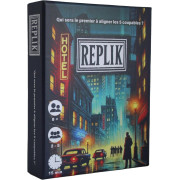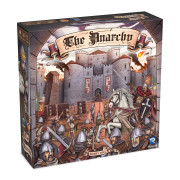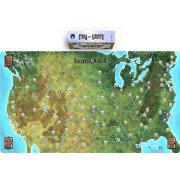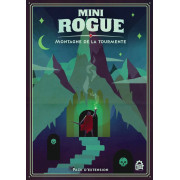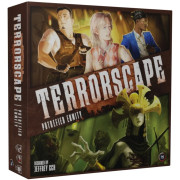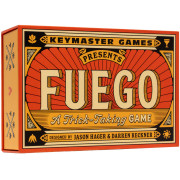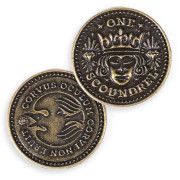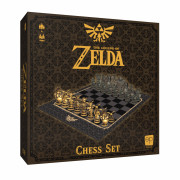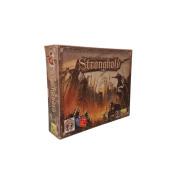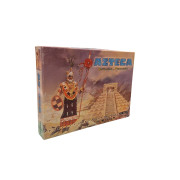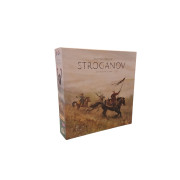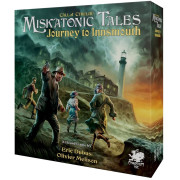Board games
Our subcategories
- Grid display
- List display
-
New
221B Baker Street: The Master Detective Game
32,95 €
Solve clever cases as Sherlock Holmes in this classic game of deduction and intrigue!
- English
- From 10 years old
- 2 to 6 player(s)
- 1 to 2h
32,95 €
Vendu par Philibert
-
New
American Psycho: A Killer Game
32,99 €
American Psycho: A Killer Game lets players compete in yuppie one-upmanship, balancing career, style, and social clout while keeping psychotic urges in check. Use strategy and t...
- English
- From 14 years old
- 2 to 5 player(s)
- 30mn to 1h
32,99 €
Vendu par EPN
-
New
The Search for Planet X - New Horizon Upgrade Pack
22,00 €
The Search for Planet X: New Horizon Upgrade Pack enhances the game with premium components. Includes metal tokens, clay theory tokens, and GameTrayz player trays for a deluxe, ...
- English
- from 13 years
- 1 to 4 player(s)
- 1 to 2h
22,00 €
Vendu par EPN
-
New
13,50 €
1980s, a crime has been committed in a grand hotel, 14 colorful suspects… but only 5 guilty ones! In REPLIK, your mission is simple: be the first to piece together the exact com...
- French
- From 8 years old
- 2 to 5 player(s)
- less than 30mn
13,50 €
Vendu par Philibert
-
New
71,99 €
The Anarchy is a strategy game set during the English civil war (1135–1153). Build your domain, defend castles, storm enemy strongholds, and accumulate Bravery, Loyalty, Influen...
- English
- from 13 years
- 1 to 4 player(s)
- 1 to 2h
71,99 €
Vendu par EPN
-
New
31,95 €
Create hiking routes with challenging elevations and breathtaking views.
- English
- From 9 years old
- 1 to 5 player(s)
- 30mn to 1h
31,95 €
Vendu par Philibert
-
NewComing soonPreorder Février
Mini Rogue - Au-Delà du Portail
This expansion is compatible with any Mini Rogue game. It contains 16 characters with illustrations redesigned by Nicolas Roblin. Their skills and/or starting characteristics ha...
- French
- From 14 years old
- 1 to 2 player(s)
- 30mn to 1h
Vendu par Philibert
-
New
Vinhos Deluxe: Expansion Bundle
39,95 €
Vinhos Deluxe Edition: Expansion Bundle Includes: All 4 Expansions for Vinhos Deluxe.
- English
- From 10 years old
- 1 to 4 player(s)
- 2 to 3h
39,95 €
Vendu par Philibert
-
New
Railways of the World: Transcontinental Neoprene Mat
42,95 €
67" by 38" neoprene mat of the combined map for Railways of the Eastern and Western U.S.
42,95 €
Vendu par Philibert
-
NewComing soonPreorder Février
Mini Rogue - Montagne de la Tourmente
This expansion is compatible with any Mini Rogue. It adds several modules that can be played together or separately, giving you a little help, adding a little spice, or even tra...
- French
- From 14 years old
- 1 to 3 player(s)
- 30mn to 1h
Vendu par Philibert
-
New
Enemies & Lovers: the Crown of Elfhame
29,95 €
Enemies & Lovers is a lightweight, fast-paced card game of strategy, deception, betrayal, and luck for 2-4 players, based on the bestselling Folk of the Air series. No special k...
- English
- From 14 years old
- 2 to 4 player(s)
- less than 30mn
29,95 €
Vendu par Philibert
-
New
45,95 €
In Putrefied Enmity, survival means navigating ruins, dodging decay, and outwitting a relentless horror that will not let its secrets rest in peace.
- English
- From 14 years old
- 2 to 4 player(s)
- 30mn to 1h
45,95 €
Vendu par Philibert
-
New
21,95 €
Play with fire in this blazing-fast trick-taking game.
- English
- From 10 years old
- 2 to 4 player(s)
- less than 30mn
21,95 €
Vendu par Philibert
-
New
17,95 €
Roll chickens, hatch eggs, and avoid those pesky foxes!
- English
- From 8 years old
- 2 to 8 player(s)
- less than 30mn
17,95 €
Vendu par Philibert
-
New
11,95 €
Upgrade your Caper: Europe experience with 10 delightfully, hefty metal coins!
11,95 €
Vendu par Philibert
-
New
38,99 €
Warp’s Edge is a solo bag-building space combat game. Pilot a starfighter against an alien mothership, warping back in time after defeat to gain new skills and weapons. Learn fr...
- English
- From 10 years old
- 1 player(s)
- 30mn to 1h
38,99 €
Vendu par EPN
-
New
Power Rangers: Heroes of the Grid – Bulk & Skull Character Pack
23,99 €
Power Rangers: Heroes of the Grid – Bulk & Skull lets players control these unlikely heroes. Use their unique abilities and Zords to tackle challenges, outsmart opponents, a...
- English
- From 14 years old
- 2 to 5 player(s)
- 30mn to 1h
23,99 €
Vendu par EPN
-
New
Avatar: The Last Airbender – Fire Nation Rising
56,99 €
A cooperative card and dice game inspired by Avatar: The Last Airbender, where players unite heroes from all four nations to defeat Lord Ozai and restore balance to the world.
- English
- From 10 years old
- 1 to 5 player(s)
- 1 to 2h
- 30mn to 1h
56,99 €
Vendu par EPN
-
New
34,00 €
Munchkin Marvel Edition lets you battle monsters and play as iconic Marvel heroes with Treasure, Allies, Powers, and custom S.H.I.E.L.D. Role Cards.
- English
- From 10 years old
- 3 to 6 player(s)
- 1 to 2h
34,00 €
Vendu par EPN
-
New
Marvel Black Panter Premium Dice Set
16,99 €
Marvel Black Panther Premium Dice Set: black/purple marbled dice with Wakandan numbers, featuring T’Challa icon, in a custom embossed tin.
- English
- From 8 years old
- 0 to 10 player(s)
16,99 €
Vendu par EPN
-
NewComing soonPreorder Février
Guess French expressions by miming them. A family game featuring 480 expressions, with bonus and penalty cards. Play, mime, laugh!
- French
- From 14 years old
- 2 to 10 player(s)
- less than 30mn
Vendu par Philibert
-
New
8,99 €
Marvel 6-sided dice set featuring Captain America, Black Widow, Iron Man, Black Panther, Hulk, and Thor in classic comic style.
- English
- From 8 years old
- 1 player(s)
8,99 €
Vendu par EPN
-
New
43,99 €
A family-friendly strategy board game where players grow a vibrant rainforest, create habitats, and attract iconic wildlife to score points and win.
- English
- From 8 years old
- 1 to 4 player(s)
- 30mn to 1h
43,99 €
Vendu par EPN
-
New
27,59 €
A hilarious party game where players guess absurd size and weight comparisons, rank the answers, and score points through clever estimation and voting.
- English
- From 10 years old
- 3 to 8 player(s)
- less than 30mn
27,59 €
Vendu par EPN
-
New
Marvel Dice Throne: Captain Marvel v. Black Panther
34,00 €
Marvel Dice Throne 2 Hero Pack featuring Captain Marvel and Black Panther, each with unique dice, player board, and deck for fast-paced dice combat.
- English
- From 8 years old
- 2 player(s)
- 30mn to 1h
34,00 €
Vendu par EPN
-
New
Marvel Dice Throne: Scarlet Witch v. Thor v. Loki v. Spider-Man
56,99 €
A fast-paced dice and card game where iconic Marvel heroes battle using unique abilities, strategy, and a touch of luck.
- English
- From 8 years old
- 2 player(s)
- less than 30mn
56,99 €
Vendu par EPN
-
NewComing soonPreorder Mars
You can see all the words except your own! In To Me … Or Not Yo Me?, work together to guess each player's words without ever speaking directly. Using well-chosen clues and your ...
- French
- From 10 years old
- 3 to 6 player(s)
- less than 30mn
Vendu par Philibert
-
New
52,00 €
A Zelda-themed chess set blending classic strategy with fantasy characters, offering engaging gameplay and collectible appeal.
- English
- From 8 years old
- 2 player(s)
- 1 to 2h
52,00 €
Vendu par EPN
-
New
16,99 €
A clever and tense card game where players must get as close as possible to a capricious cat without passing it, using bluffing, counting, and smart timing.
- English
- From 8 years old
- 2 to 6 player(s)
- less than 30mn
16,99 €
Vendu par EPN
-
NewComing soonPreorder Mars
A short game that starts with the end, explosive, but always ends well! With Crack Rimes, you'll be rhyming “board game” with “start again”!
- French
- From 10 years old
- 2 to 8 player(s)
- less than 30mn
Vendu par Philibert
-
New
Avatar: The Last Airbender – Aang's Destiny
56,99 €
A cooperative, story-driven deck-building game where players take on the roles of Aang and his allies to restore balance to the world across missions inspired by the beloved ser...
- English
- From 10 years old
- 2 to 4 player(s)
- 30mn to 1h
56,99 €
Vendu par EPN
-
NewComing soonPreorder Février
Roll the dice to get combinations of eggs and their corresponding cooking methods to score points. But be careful: rotten eggs could ruin your breakfast!
- French
- From 8 years old
- 2 to 5 player(s)
- less than 30mn
Vendu par Philibert
-
NewComing soonPreorder Mars
In this classic game by Reiner Knizia, bet on the savannah animals that will earn you the most points, and collect as many as possible. Increase the value of your animal photos ...
- French
- From 7 years old
- 2 to 5 player(s)
- less than 30mn
Vendu par Philibert
-
New
16,95 €
In the dungeon, your party will encounter hidden dangers, loot and glory…
- English
- From 9 years old
- 1 to 3 player(s)
- less than 30mn
16,95 €
Vendu par Philibert
-
Promotion -20%
Funkenschlag: Outpost - Bargain
47,96 €59,95 €
Wrapped box - Intact game material - Damaged box - See picture - Multilingual game
- English, German
- From 12 years old
- 2 to 6 player(s)
- 1 to 2h
47,96 €59,95 €
Vendu par Philibert
-
NewComing soonPreorder Mars
In Soupçons, players work together to discard “Night” cards and keep only “Day” cards. But ‘Snake’ cards are hidden in the deck and corrupt certain players, pushing them to win ...
- French
- From 8 years old
- 3 to 6 player(s)
- less than 30mn
Vendu par Philibert
-
New
24,95 €
Neko Syndicate is a "Thinky-filler" by Dani García, featuring an innovative tableau building mechanic where cards are both the actions and the goals to achieve: fast set-up, sim...
- English
- From 14 years old
- 1 to 4 player(s)
- 30mn to 1h
24,95 €
Vendu par Philibert
-
NewComing soonPreorder Mars
Combomino is a tile-placement game. Simple and addictive, it nevertheless offers many possibilities and options. Will players know how to position their Yokai to perform the bes...
- French
- From 6 years old
- 2 to 4 player(s)
Vendu par Philibert
-
New
29,50 €
Stronghold - second hand — French language board game, complete, good overall condition, tactical siege conflict between defenders and attackers.
- French
- From 14 years old
- 2 to 4 player(s)
- 2 to 3h
29,50 €
Vendu par Pioche & Rejoue
-
New
44,00 €
Alone - second hand — French language board game, complete, good overall condition, asymmetric survival exploration game.
- French
- From 14 years old
- 2 to 4 player(s)
- 2 to 3h
44,00 €
Vendu par Pioche & Rejoue
-
New
15,00 €
Azteca - second hand — French language strategy board game, complete, good overall condition, conquest and conflict in the Valley of Mexico.
- French
- From 10 years old
- 3 to 4 player(s)
- 2 to 3h
15,00 €
Vendu par Pioche & Rejoue
-
New
29,50 €
Stroganov - second hand — French language strategy board game, complete, good overall condition, exploration and resource management in Siberia.
- French, Hollandais
- From 12 years old
- 1 to 4 player(s)
- 1 to 2h
29,50 €
Vendu par Pioche & Rejoue
-
NewComing soonPreorder Mars
In Metro Bingo, a numbered tile is drawn from a bag each turn, and all players must write it down on their own metro map, carefully choosing where to place it. Your goal is to s...
- French
- From 7 years old
- 0 to 10 player(s)
- less than 30mn
Vendu par Philibert
-
NewPreorderAvail. Mai
Call of Cthulhu: Miskatonic Tales: Journey to Innsmouth
58,95 €
Miskatonic Tales: Journey to Innsmouth is an immersive board game that transports you into the world of the Cthulhu Mythos and confronts you with forbidden knowledge that eagerl...
- English
- From 14 years old
- 1 to 4 player(s)
- 2 to 3h
58,95 €
Vendu par Philibert
-
New
Thunder Road: Vendetta Deluxe Edition
62,95 €
Crews race and shoot to win the race... or be the last car standing.
- English
- From 8 years old
- 2 to 4 player(s)
- 1 to 2h
62,95 €
Vendu par Philibert
-
New
34,95 €
Use cleverness and careful planning to craft a stained glass window masterpiece in the Sagrada Familia.
- English
- From 10 years old
- 1 to 4 player(s)
- 30mn to 1h
34,95 €
Vendu par Philibert
-
NewComing soonPreorder Mars
In Letter Up, the goal is to skillfully place your words to reach the edges of the playing area and mark territories. In a duel, the first player to place all 6 of their pieces ...
- French
- From 10 years old
- 1 to 2 player(s)
- less than 30mn
Vendu par Philibert
-
New
34,95 €
Dive into the enchanting world of Fabulus Creatures with over 20 guided experiments that allow children to discover the fascinating powers of 15 magical creatures: dragon, phoen...
- French
- From 8 years old
- 2 player(s)
- less than 30mn
34,95 €
Vendu par Philibert
Are you looking for a board game? Good news! You are at the right place. At Philibert, you will find all kinds of board games. From adult board games for experienced players, to children's games accessible from a very young age, to family games for fun with friends or the whole family.
In addition to finding the great classic games (Monopoly, Trivial Pursuit, Cluedo, Uno, Scrabble, La Bonne Paye, Puissance 4), you will also discover the great titles of modern board games such as 7 Wonders, Dixit, Catan, Carcassonne, Unlock, Les Aventuriers du rail, Splendor, Skyjo, Codenames, Time's Up and many others.
Copyright © 2026 www.philibertnet.com Legals - Privacy Policy - Cookie Preferences - Sitemap




